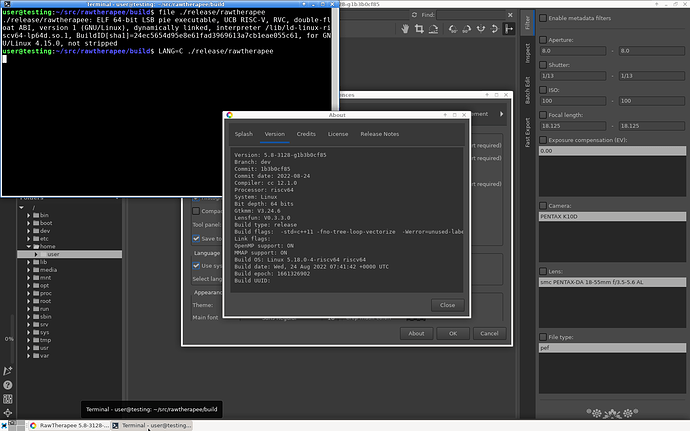I only see “scheduled” in the ARM line.
That simply means that a new build has been scheduled. This may happen for different reasons (dependency update, manual retrigger, new version, etc). If you go here (State of openSUSE_Factory_ARM for graphics / rawtherapee - openSUSE Build Service) you can see the generated binaries.
I have just searched the documentation of RT and did not find anything about this: what are the minimum hardware requirements for RT?
I could give the non-answer: “a computer”. But in all honesty, I don’t know. Any lower margin seems very arbitrary to me. It depends heavily on the raw input (megapixels) and which modules you use.
In principle, any modern 64-bit computer with a half-decent CPU and some RAM could process most raw formats comfortably.
Here’s my latest adventure:
This is RT on Debian unstable RISC-V 64bit in QEMU. It took some time to get the VM ready and even some more to compile RT. But works as designed, albeit slow. 

Best,
Flössie
Nope but should work, even on older Pi hardware. Personally I’d recommend something like a 4GB Pi4, if only for the RAM. Image processing is usually RAM-intensive.
I do a huge amount of stuff with Pis at work, but it’s all headless.
Also Pis have become unobtainium lately.
In theory vkdt should be able to compile/run on Pis with fairly minimal work now that there is full Vulkan support on Pi 4. darktable would have issues likely due to OpenCL-on-Vulkan translation layers being, um… “meh” at best and Pi only supporting Vulkan and not OpenCL. Same problem darktable would have on the likes of NVidia Jetson - NVidia does not support OCL on their ARM platforms, so your choices are CUDA or Vulkan or an OpenCL-on-Vulkan translation layer. Every one I am aware of depends on clspv, which is limited to a subset of OpenCL 1.2.
